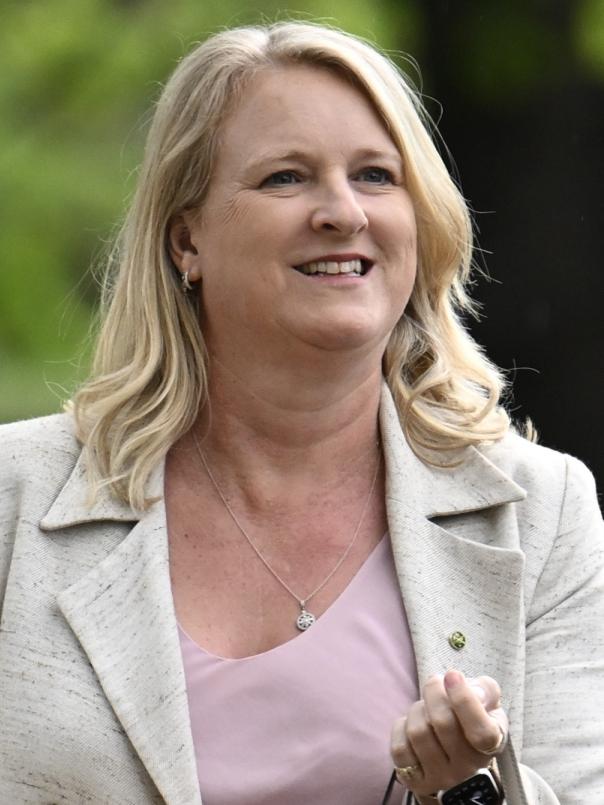Genetic discrimination ban stranded by Labor
What should have been a celebratory final sitting week for Stephen Jones saw him grilled by crossbenchers for leaving a long promised genetic discrimination ban to the next government.

The Albanese government has been accused of risking lives by dropping a promised genetic discrimination ban in its rush towards the upcoming election, with no minister responsible for carrying it forward and closed-door meetings suggesting it has “lost momentum”.
Depending on the timing of the next election, February’s past sitting fortnight may have been the last opportunity to introduce a promised amendment which would ban life insurers from accessing the genetic screening results of prospective customers in a bid to prevent discriminatory adjustments to premiums and denial of service.
In September, outgoing Finance Minister Stephen Jones announced the ban, but Treasury documents indicated a backlog of promised legislation delayed the promised change.
The opposition, crossbenchers and stakeholders said the commitment has been dropped, while lead advocate and geneticist Jane Tiller pushed for a new bipartisan agreement to legislate within the first hundred days of the next government.
When questioned by The Australian, both parties were hesitant to agree.
Genetic tests can give insight into an individual’s probability of developing certain diseases. It is largely unlawful to discriminate based on information in these tests, with one major caveat.
Risk-rated insurance, namely life insurance, is the one sector still cleared to change rates or refuse service based on someone’s predisposition to heritable diseases. Despite life insurers holding themselves to a partial prohibition on the practice since July 2019, insurance discrimination remains the largest factor in why patients avoid testing.
In what may have been Mr Jones’s last sitting week ahead of retirement, his victory lap was marred by a closed-doors meeting with a crossbench delegation outraged at the lack of progress.
Senator David Pocock and teal independents Zoe Daniel and Kylea Tink questioned him, along with a cadre of Treasury officials, on whether the bill was likely to survive into the 48th parliament.


“When you ask what happens (next) you get looks from the department people which say that it completely depends on who returns to government,” Ms Tink said. “Our message was incredibly direct that the fact that this parliament is ending without that legislation introduced is unacceptable. It’s not just disappointing, it actually puts Australians’ lives at risk.”
“It’s just a dog breakfast. It shouldn’t have been allowed to get this far.”
She backed Dr Tiller’s call for both parties to support passing the ban in their first 100 days.
“This is not difficult legislation and in fact we know Treasury is already working on (it) and they will continue to work on it even as the government goes into caretaker mode,” the North Sydney MP said.
“I think the real risk at the moment is that this political promise could end up being completely orphaned as Stephen leaves parliament.”
Treasury staff indicated a current round of consultation, set to run until March 12, would be followed by an additional round of community submissions before it could see the floor of parliament, Ms Tink said.
Dr Tiller said Jim Chalmers had an obligation to shepherd the legislation into the next term, given it was a Treasury commitment.
“He needs to take responsibility to this commitment that his government has made,” she said.
“Of course, I have concerns that we may lose momentum after the election, there are concerns that the government may change. The government may have different priorities. A new minister may have other priorities that they would like to put ahead of this, which is why it’s so important that the government reiterates its commitment to this issue and puts a time frame around it.”
Opposition health spokesman Anne Ruston said a ban would be a “matter of urgent priority if elected”.
“The Coalition is committed to protecting Australians from genetic discrimination in life insurance,” she said.
“This is a betrayal of trust between the government and the Australian patients who would have been safeguarded by this legislation. These are patients who want to do the right thing and get themselves tested.”
A spokesman for Mr Jones gave remarks nearly identical to statements provided in December and January.
“The Albanese government is committed to legislating a ban on the use of adverse genetic test results in life insurance underwriting,” the spokesman said.
“This is government policy and work is under way to implement the ban as soon as practicable.”
The bill is a tripartite effort between Treasury, the Health Department and the office of the Attorney-General.





To join the conversation, please log in. Don't have an account? Register
Join the conversation, you are commenting as Logout